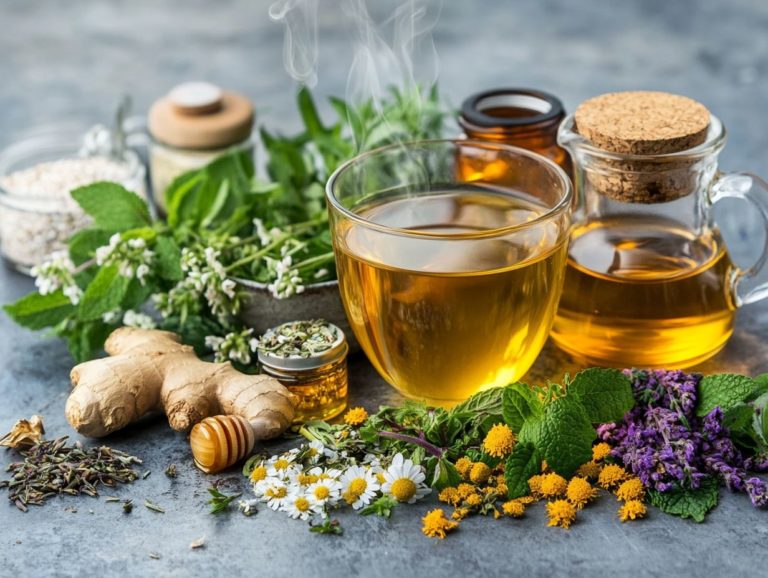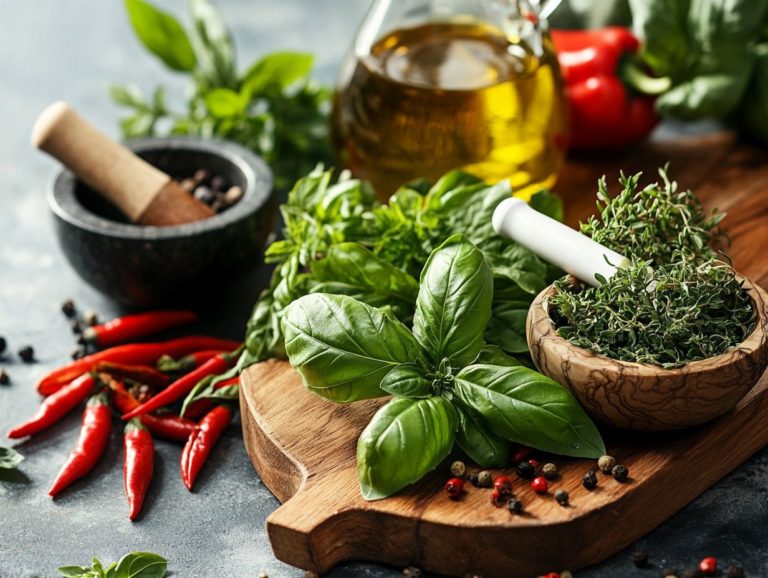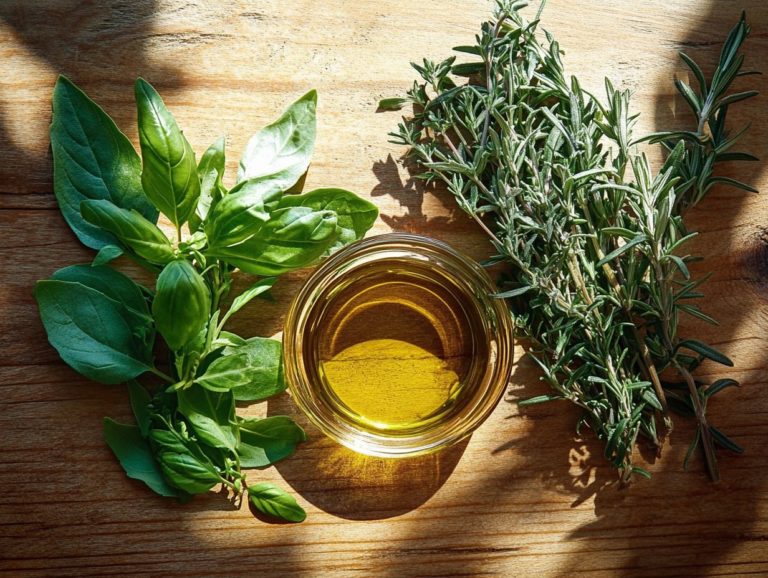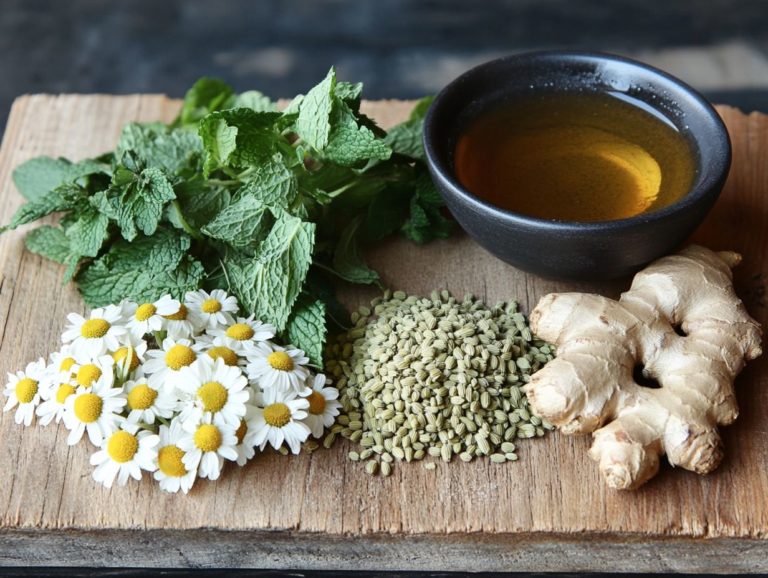Healing Herbs for Common Ailments
Healing herbs have been treasured for centuries. They provide natural remedies for various ailments.
From soothing headaches to alleviating digestive issues, these remarkable plants offer relief without the unwanted side effects that often accompany pharmaceuticals.
Explore specific herbs tailored to address common health challenges, uncover effective methods for their use, and discover how to cultivate your own healing herb garden right at home.
Embrace the restorative power of nature and elevate your well-being to new heights!
Contents
- Key Takeaways:
- Common Ailments and Corresponding Herbs
- How to Use Healing Herbs
- Growing Your Own Healing Herb Garden
- Frequently Asked Questions
- What are some common ailments that can be treated with healing herbs?
- What are some commonly used healing herbs for treating headaches?
- Can healing herbs be used to relieve joint pain?
- Are there any healing herbs that can help with digestive issues?
- Can healing herbs be used to boost the immune system?
- Are there any healing herbs that can be beneficial for skin conditions?
Key Takeaways:
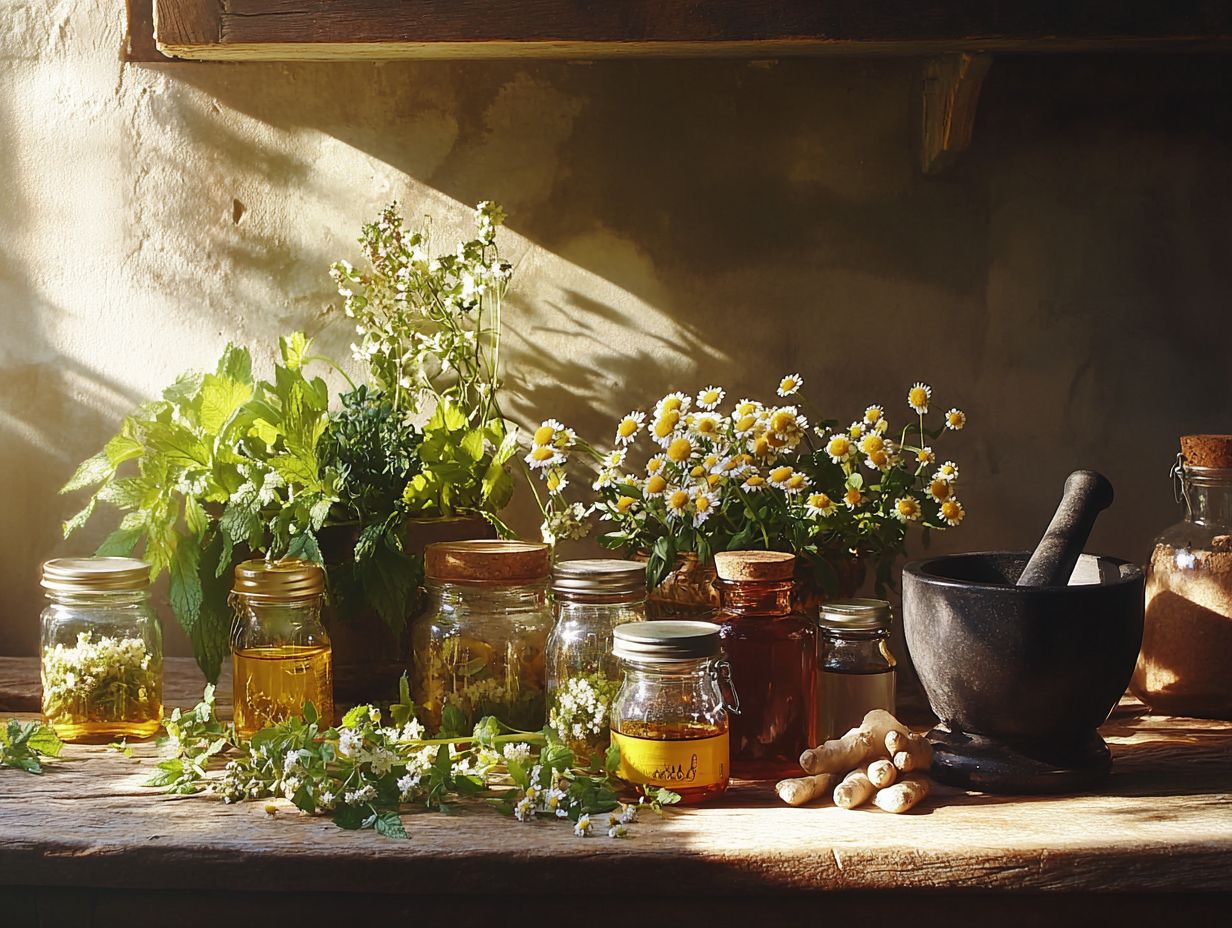
- Nature’s medicine cabinet: Healing herbs can be used to address common ailments such as headaches, digestive issues, anxiety, and colds and flu.
- Versatility in consumption: Healing herbs can be consumed in various forms such as teas, tinctures, and capsules. It’s important to be aware of potential interactions and precautions when using them.
- Personalized healing: Growing your own herbal garden allows for easy access to fresh, organic herbs and the ability to tailor your remedies to your specific needs and preferences. Start your journey today and watch your health flourish!
What are Healing Herbs?
Healing herbs, often referred to as medicinal herbs, play a vital role in both traditional medicine and modern wellness practices. They offer a variety of health benefits that span from alleviating anxiety to supporting immune function. These remarkable plants have been cherished for centuries across various cultures, particularly within Ayurveda (a traditional Indian healing system), where they are esteemed for their therapeutic properties.
By integrating herbs like turmeric, ashwagandha, and ginseng into your daily routine, you can tap into natural dietary supplements that may enhance your overall health and well-being. This effectively bridges the wisdom of ancient practices with contemporary health solutions.
In numerous cultures, such as Traditional Chinese Medicine and Indigenous healing practices, these herbs are held in high regard, often credited with promoting longevity and vitality. For instance, eucalyptus is renowned for its respiratory benefits, while elderberry is celebrated for its immune-boosting abilities.
Incorporating these herbs into your life can be both simple and enjoyable, whether through herbal teas, tinctures, or culinary creations. The rising interest in holistic health has led to greater acceptance of these natural remedies, inviting you to embrace their healing potential and delve into the rich tapestry of knowledge passed down through generations.
Common Ailments and Corresponding Herbs
Certain common ailments can be effectively tackled with the right herbs, including herbal remedies for common digestive complaints, each one bringing its unique health benefits tailored to various symptoms and conditions.
Take garlic, for example; it s celebrated for its immune-boosting abilities. Then there s ginger, which is lauded for its anti-inflammatory properties perfect for easing muscle pain.
Chamomile and lavender are beloved for their soothing qualities, offering relief from anxiety and fostering relaxation. Meanwhile, echinacea stands out for its effectiveness in alleviating cold and flu symptoms.
This highlights how versatile these healing plants are in traditional medicine.
Say Goodbye to Headaches: Effective Herbs to Try!
Herbs have long been recognized for their great ability to alleviate headaches and migraines. Several medicinal varieties offer effective relief. Take ginger, for instance its anti-inflammatory properties can significantly reduce the intensity of migraines.
Then there’s ginkgo, which may enhance circulation and relieve tension headaches. By incorporating these herbs into your dietary supplements or herbal remedies, you can address immediate symptoms while reaping overall health benefits. This makes them a valuable addition to both preventive and reactive health strategies.
Feverfew is another noteworthy herb, frequently studied for its potential to prevent migraines. It’s often associated with a reduction in frequency for regular users. Many people report that consuming feverfew in tea form or as capsules has led to significant improvements over time.
Peppermint oil is also worth mentioning; when applied topically to the temples, it provides a refreshing cooling effect that can effectively ease tension headaches. Scientific studies reveal that the menthol in peppermint enhances blood flow and relaxes muscles, contributing to pain relief.
Each herb offers unique benefits, making personalized exploration essential for anyone seeking natural relief. Keep a journal of what works best for you!
Herbs for Digestive Issues
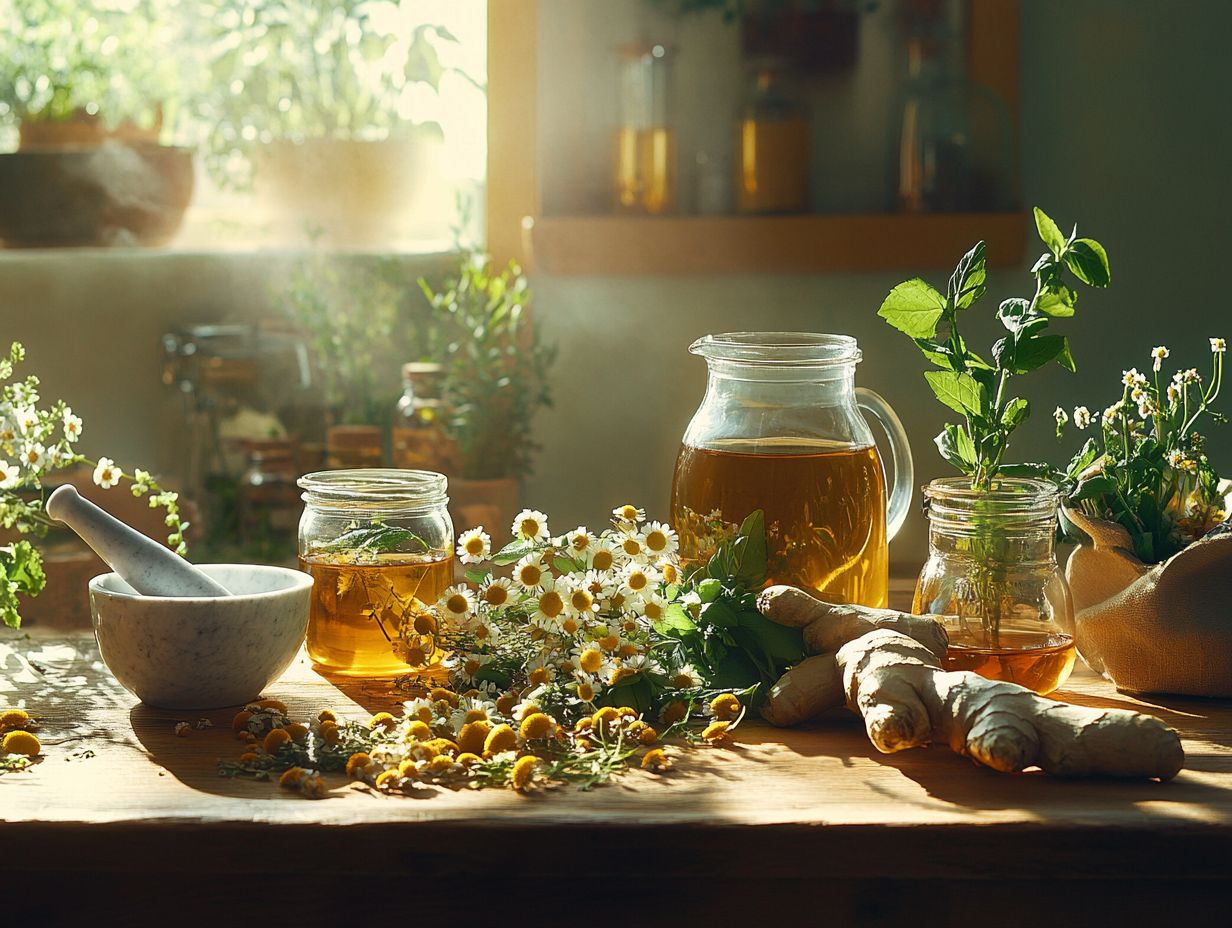
Certain herbs have long been celebrated for their ability to tackle digestive issues, providing a natural pathway to enhance your gut health. Take ginger, for example. It’s renowned for alleviating nausea and improving digestion.
Then there s garlic, famous for its antimicrobial properties that support a balanced gut flora. By incorporating these medicinal herbs into your routine, you’ll quickly discover amazing health benefits from improved digestion to reduced discomfort from common digestive ailments.
Let s not overlook peppermint, which is gaining fame for its soothing effects on the gastrointestinal tract. It’s a great ally against bloating and gas. You can easily enrich your diet through various preparation methods, whether by brewing herbal teas or adding dried herbs to your meals.
Clinical research has been promising, especially regarding peppermint oil and its role in managing symptoms of irritable bowel syndrome. These amazing herbs not only highlight the potential of natural remedies but also encourage mindful consumption for optimal digestive health.
Herbs for Anxiety and Stress
If you re looking for natural ways to manage anxiety and stress, certain herbs can be your effective allies in promoting emotional well-being. Take ashwagandha, a revered herb in Ayurveda known for its ability to lower cortisol levels and enhance resilience to stress.
Lavender and St. John s wort are also noteworthy, celebrated for their calming properties that can be invaluable for anyone grappling with anxiety. By incorporating these herbal remedies into your daily routine, you can nurture your mental health and gain holistic support for stress management.
Other herbs like chamomile and passionflower also play significant roles in alleviating anxiety symptoms. Chamomile is packed with antioxidants that may promote relaxation and help you drift off to sleep, while passionflower is believed to enhance gamma-aminobutyric acid (GABA) levels a neurotransmitter known for stabilizing mood.
Clinical studies have highlighted the benefits of these herbs, with many participants reporting a decrease in anxiety after consistent use. It s crucial to consult with a healthcare professional to determine the best herb or combination of herbs for your unique needs, ensuring a safe and effective approach to managing anxiety and stress.
Don t wait try these herbs today for a healthier tomorrow!
Herbs for Colds and Flu
During cold and flu season, certain herbs can be invaluable in strengthening your immune system and alleviating pesky symptoms. Echinacea is a standout, known for its ability to support immune function and help reduce the duration and severity of colds.
Garlic is renowned for its antimicrobial effects, assisting in warding off infections and promoting overall health during illness. Incorporating these medicinal herbs into your diet can enhance your natural defenses and facilitate quicker recovery from common respiratory ailments.
Elderberry has surged in popularity for its robust antiviral properties, often highlighted in research for its capacity to shorten flu symptoms. If you need something soothing, ginger is an excellent choice, celebrated for its anti-inflammatory effects and its knack for easing sore throats.
The preparation of these herbs ranges from simple teas to more intricate tinctures. Many individuals find relief by adding these herbs to their diets during peak illness seasons, underscoring their effectiveness and natural origins.
How to Use Healing Herbs
Utilizing healing herbs effectively requires understanding the many ways to use them to maximize their health benefits. Whether you prefer enjoying herbs as teas, tinctures, capsules, or in their whole form, the preparation method can greatly impact their potency and efficacy.
For example, brewing chamomile and ginger into teas delivers soothing effects. Tinctures offer a more concentrated dose. It s crucial to select the right approach that aligns with your individual health goals and preferences.
Methods of Consumption
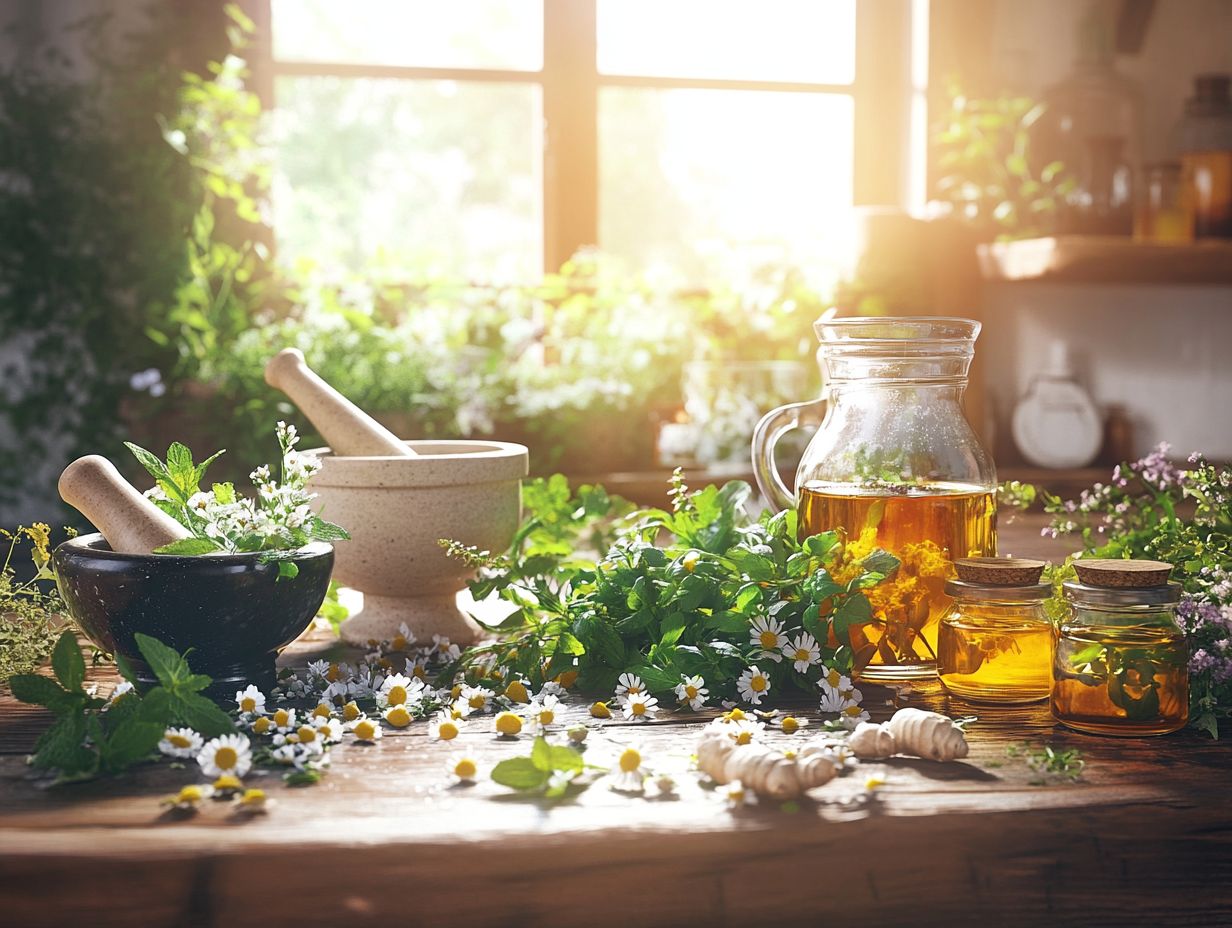
The methods of consuming medicinal herbs can differ significantly, each presenting unique advantages in terms of efficacy and convenience. Teas are a favored choice, allowing for effortless extraction of the herbs’ benefits. Tinctures offer a concentrated form that your body can absorb quickly. Capsules and powders provide straightforward ways to incorporate herbs into your daily routine without fuss.
Understanding these various methods helps you choose the best approach for your needs. This is key to achieving your health goals.
Consider the differences in bioavailability and the onset of effects among these methods. For instance, teas usually have a slower onset because they need to be digested, while tinctures might provide quicker results thanks to their alcohol base, which speeds up absorption.
If you lead a busy lifestyle, capsules could be your go-to for convenience. Powders may attract health enthusiasts who enjoy mixing herbs into their smoothies.
It’s crucial to assess your personal health objectives whether you re seeking immediate relief, long-term wellness, or simply want to integrate herbs into your diet to make an informed decision. Weighing the pros and cons of each method allows you to tailor your herbal intake to fit your specific needs and daily routine.
Precautions and Possible Interactions
While herbs are powerful allies for health, knowing their potential risks is vital. It’s essential to understand the precautions and potential interactions that come with their use.
It s easy to overlook these factors, thinking that natural remedies are always safe. Take garlic, for example; it s great for cardiovascular health, but it can also thin the blood and interact with anticoagulant medications. Similarly, ginseng might rev up or slow down various bodily functions, interfering with diabetes medications.
Therefore, if you re considering using these or other medicinal herbs, stay informed about their effects and consult with a healthcare professional especially if you have preexisting health conditions or are on prescription drugs.
This proactive approach paves a safer path to wellness through herbal supplements.
If you re feeling unwell, don t wait consider trying these herbs today! Explore the world of healing herbs and start your journey to better health!
Growing Your Own Healing Herb Garden
Creating your own healing herb garden is rewarding. You can cultivate fresh medicinal herbs at home while enjoying many health benefits.
Growing herbs like turmeric, lavender, and chamomile enhances your culinary experiences. You also gain tools for natural remedies deeply rooted in traditional practices.
With the right conditions, knowledge, and care, you can develop a flourishing herb garden. This garden serves both aesthetic and functional purposes, enriching your health and overall well-being.
Benefits and Tips for Growing Herbs at Home
Growing herbs at home is exciting! You’ll enhance your dishes and create natural remedies that boost your health. With home gardening, you control the quality of your herbs, ensuring they re free from harmful sprays.
Cultivating healing plants like ashwagandha and ginseng fosters a sustainable lifestyle. It also brings fulfillment as you nurture these healing plants through their growth cycles.
Starting your own herb garden improves not just your cooking but also your overall well-being. When choosing herbs, consider delightful options like basil, rosemary, and mint. They adapt well to various indoor environments.
These green companions thrive best in sunny settings with well-draining soil and regular watering. This allows them to flourish beautifully.
Regular pruning encourages healthy growth and generous yields. Each time you use your homegrown herbs, you deepen your connection to your food and wellness, nurturing a transformative lifestyle rooted in natural health.
Frequently Asked Questions
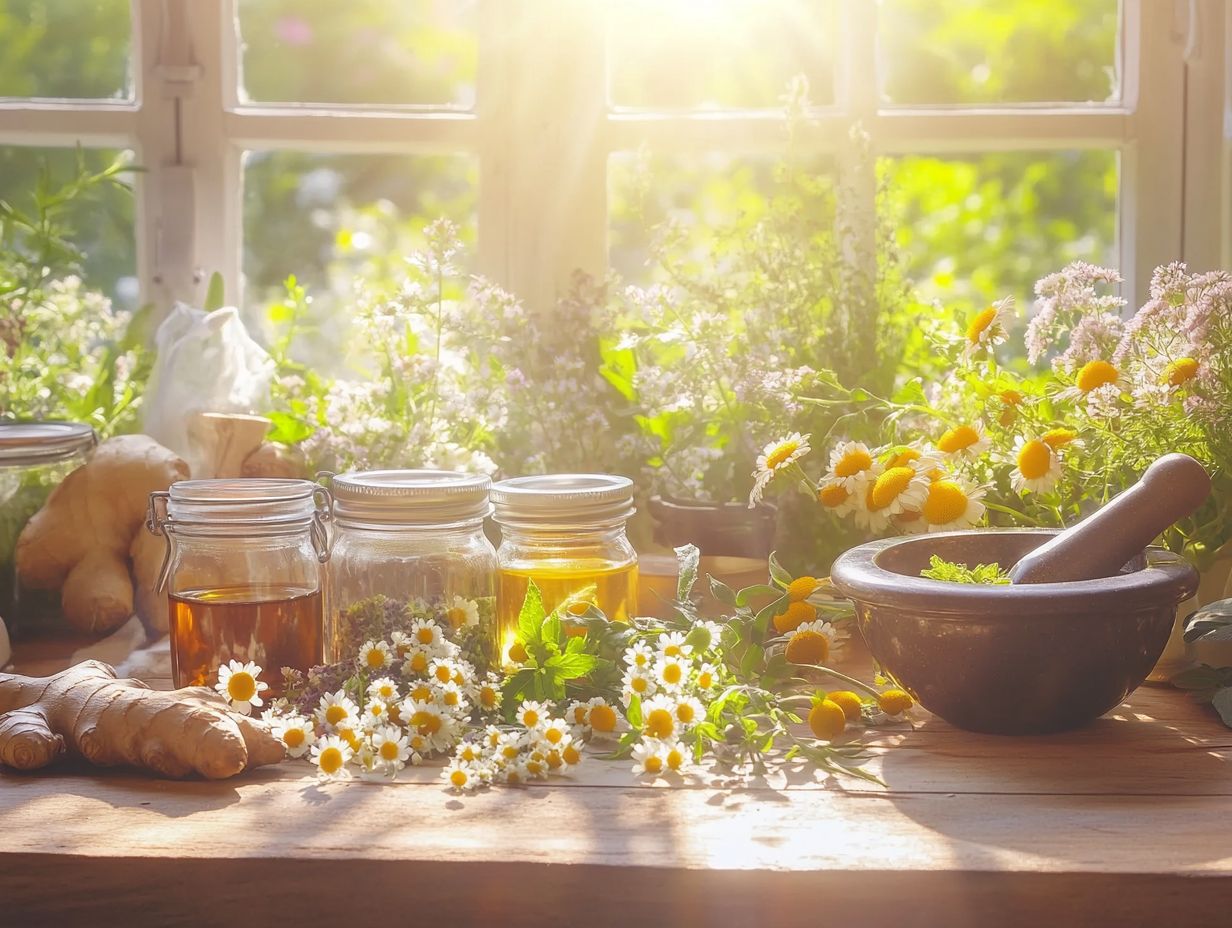
What are some common ailments that can be treated with healing herbs?
Common ailments treated with healing herbs include headaches, joint pain, digestive issues, cold and flu symptoms, and skin conditions.
What are some commonly used healing herbs for treating headaches?
Common herbs for headaches include feverfew, peppermint, and ginger. These herbs help alleviate tension headaches and migraines.
Can healing herbs be used to relieve joint pain?
Yes, herbs like turmeric, ginger, and devil’s claw can relieve joint pain. They have anti-inflammatory properties that reduce swelling and pain.
Are there any healing herbs that can help with digestive issues?
Absolutely! Many healing herbs help with digestive issues, including peppermint, ginger, chamomile, and fennel. They soothe stomach discomfort, alleviate bloating, and aid digestion.
Can healing herbs be used to boost the immune system?
Yes, herbs like echinacea, elderberry, and astragalus have immune-boosting properties. They strengthen the immune system and help prevent colds and flu.
Are there any healing herbs that can be beneficial for skin conditions?
Yes! Many healing herbs benefit skin conditions, such as aloe vera, calendula, and tea tree oil. They have anti-inflammatory and antimicrobial properties that help with acne, eczema, and other irritations.

